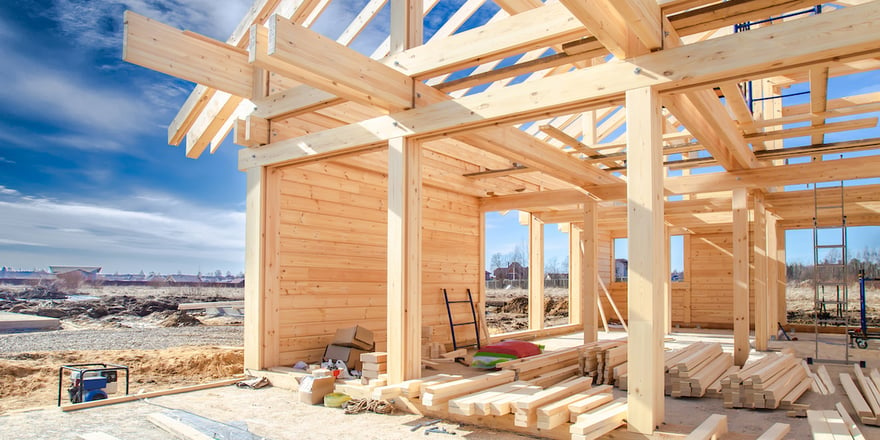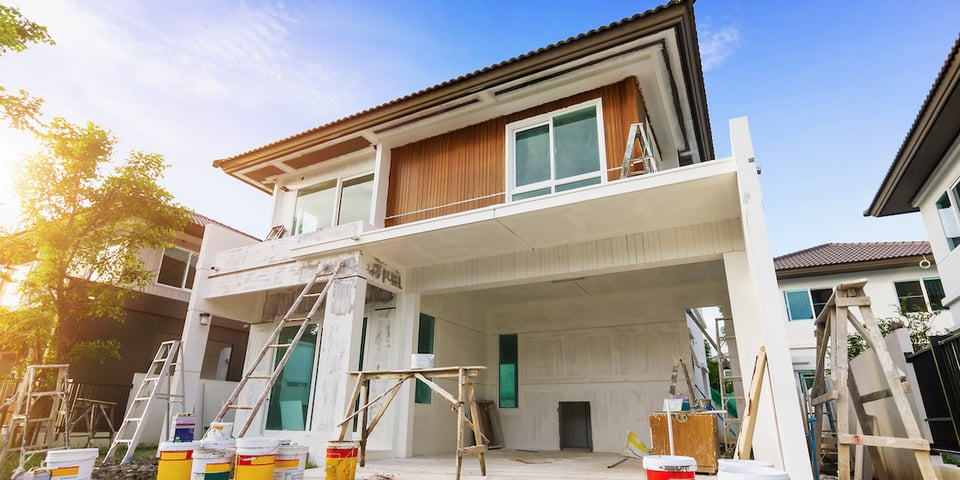Before securing financing for your next property, keep in mind that not all construction loans are created equal. Each loan is structured differently to suit a range of needs, from ground-up construction to renovation. To help you choose a residential construction loan with favorable terms for your next project, we’re outlining the types of loans and how to qualify and evaluate lenders.
Understanding Residential Construction Loans
As you consider different real estate investments, such as whether to build a new house or rehabilitate a neglected or estate sale home, there are multiple ways to finance your project. For investors, construction loans offer practical advantages over traditional mortgages or personal loans. For those who are looking to build their dream home, construction loans afford you the opportunity to build it the way you want.
Residential construction loans can cover:
- Land
- Labor
- Permits
- Materials
- Appliances and fixtures
- Contingencies
Construction loans for new development present a strategic opportunity for emerging property markets or areas with high demand. New homes often have better price appreciation and energy efficiency, they’re low maintenance, and they increase inventory for eager buyers.
Types of Residential Construction Loans
- Construction-Only Loan: This is a loan for ground-up construction. It must be paid in full or refinanced after the loan term.
- Construction-to-Permanent Loan: This type of loan finances new construction and converts to a mortgage after the home is built.
- Renovation Loan or Rehab Loan: This loan is used to cover the purchase and renovations of a home, with financing based on the anticipated value after construction.
- Owner-Builder Loan: This type of loan is typically only available to owners that are licensed contractors. Few lenders offer this type of loan, but the terms will be similar to other construction loans.
5 Ways Construction Loans Differ from Traditional Mortgages
- Residential construction loans are structured for the construction schedule, in most cases, 12-18 months.
- Rather than a lump sum, funds are sometimes distributed in stages as construction progresses through major milestones, such as establishing the foundation or framing.
- Depending on the lender, repayment may begin during construction; payments can be made by either the borrower or with an interest reserve account that often can be included in the loan.
- Interest rates are sometimes higher but often the same as fix-and-flip or buy-and-hold private money loans. Interest rates can also be variable due to the higher risk of undeveloped or uninhabited properties.
- The loan must be paid in full or refinanced when construction is complete.
In conventional mortgages, the house secures the loan as collateral, reducing risk to the lender. While some residential construction loans may be secured with the land or an existing home as collateral, the lender still takes on a higher level of risk if the borrower defaults and the project remains incomplete.
Due to the short loan schedule and installments of funds, it’s critical to choose a construction loan that aligns with your budget, project needs, or investment goals. Mismatched loan terms can lead to financial challenges, such as cost overruns, delayed construction, and compromising the quality of the final build. Review residential construction loan options carefully to set yourself up for success.
Financing Residential Construction
As with all financing, having a well-documented application will help make your case. Residential construction lenders will each have different requirements, so your circumstances and specific needs will play a significant role in financing.
Qualifying for a Residential Construction Loan
Lenders will want to verify your financial standing with your credit score, debt-to-income ratio, tax history, and a larger down payment to offset the higher risk.
Whatever type of project you have in mind, lenders will want to review the details of your construction plan and the property to assess eligibility for financing.
Criteria will be much more stringent with conventional banks, so compare guidelines for borrowers and properties before applying to save yourself needless frustration.
Improving Your Case: Best Practices
If you’re wondering how to get a residential construction loan approved easily, there are a few ways to strengthen your application:
- Contract a licensed builder before you apply. This is a requirement for most construction loans.
- Compile detailed documentation for your construction plan, including the budget, project estimates, designs, and required permitting. This will demonstrate the value of the property when completed and help ensure you receive the necessary funds to support your budget. As a bonus, have a list of any past projects if this isn’t your first.
- Meet early with a construction lender to work out a budget and ensure that you have sufficient resources to complete the project you are looking to build.
Evaluating Lenders and Loan Terms
When reviewing your options, look for reputable lenders with experience in construction financing, including private money lenders, who may offer more flexible terms than conventional banks.
Factors to inform your search should include:
- Whether the lender offers the specific type of construction loan suited for your project
- Whether eligibility requirements are too stringent for the property or your financial history
- How favorable the loan rates and repayment terms are
- Payment penalties and other fees that may cause financial strain
- How quickly they can close financing to fund your construction loan
- How fast they can turn around your draws
Consider the last notes with extra weight because the time to close financing could impact your ability to begin or complete your project on schedule. By taking each into account, you can make an informed decision about the best lender and loan terms for your construction project.
Secure Your Construction Financing with Herzer
When it comes to real estate ventures, how you finance can impact the success of your investment, so it's essential to select the right residential construction loan for your needs.
Herzer Financial Services has offered private construction loans and real estate lending since our founding in 1950. We offer unsurpassed service and expertise you can rely on. Contact the Herzer team to learn more.





